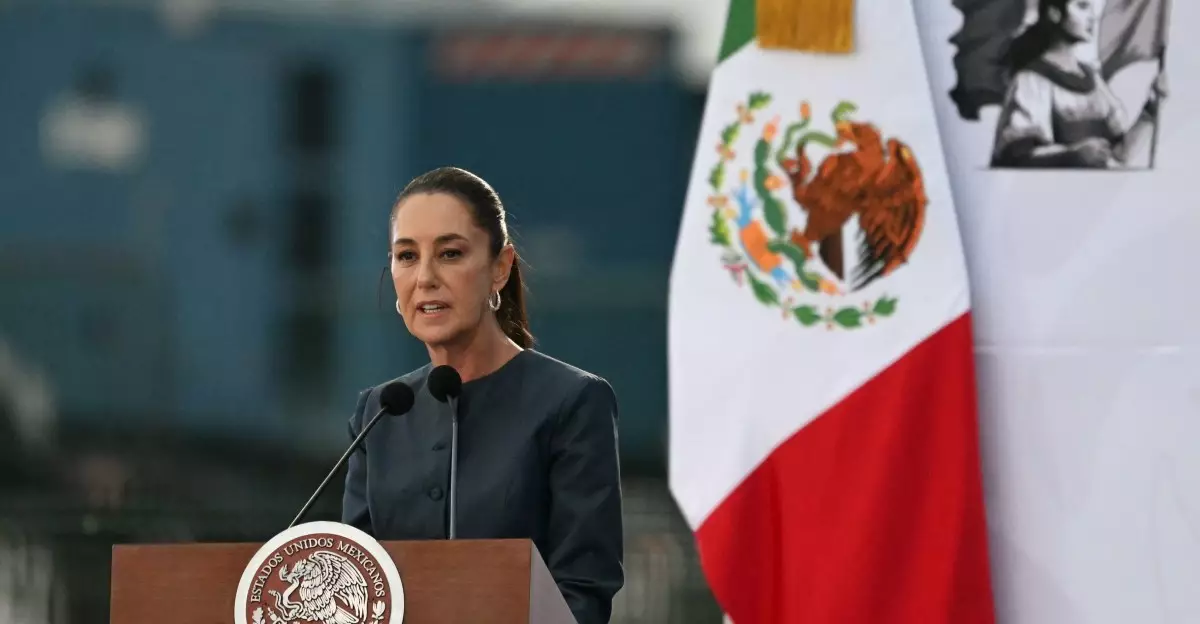In a turbulent political landscape, few maneuvers can ignite international discussions like geographical nomenclature, especially when national pride is at stake. The recent controversy stemming from former President Donald Trump’s directive to change the Gulf of Mexico to “Gulf of America” presents a case study on how something as seemingly innocuous as a name can morph into a symbol of larger geopolitical tensions. Mexican President Claudia Sheinbaum’s vehement response to Google’s compliance with this directive was both a cultural and legal stance that transcended mere semantics.
The roots of this dispute lie in America’s complex relationship with its southern neighbor and the implications that arise when a nation makes unilateral decisions regarding geographic labels. It’s indicative of how identity, history, and nationalism can shape perceptions, even through something as simple as a name on a map. The Gulf of Mexico is not just a body of water; it embodies centuries of interaction, trade, conflict, and cooperation between the nations surrounding it. Thus, the renaming attempt is less about cartography and more about power dynamics.
Mexico’s Legal Standpoint Against Big Tech
The decision by Sheinbaum’s administration to sue Google is emblematic of Mexico’s reluctance to acquiesce to a narrative that diminishes its national dignity. By asserting that the naming rights of such an international body of water shouldn’t belong solely to one country, Mexico is reclaiming its agency in a conversation where it feels overshadowed. This litigation is not merely a corporate responsibility issue; it signifies a larger battle over historical legacy and representation.
Moreover, Sheinbaum’s remarks during her press briefing accentuate this point: “The only thing we want is compliance with the decree issued by the United States government.” It’s striking that she insists on the separation of designations based on territorial jurisdiction while firmly stating that Mexico’s waters cannot be renamed by external forces. Her government’s lawsuit isn’t just an attack on Google but rather a defense against a perceived attempt by the U.S. to exert its influence over Mexico’s identity.
The Role of Technology in Geopolitical Narratives
As technology continues to reshape the landscape of communication and information, the way we interpret and interact with maps has also evolved. Google, as a global leader in digital mapping services, carries a unique responsibility. Its decisions can reinforce or undermine international tensions, depending on how they choose to recognize or alter geographic names.
When Google adjusted its maps to incorporate Trump’s naming directive, it set a precedent that could resonate beyond just cartographic implications. Apple’s subsequent compliance further solidified this reality, showing the extent to which tech companies can influence public perception. It raises critical questions about the autonomy of corporations in geopolitical matters and challenges the notion that technology exists outside the realm of political influence.
A Broader Reflection on Identity and Sovereignty
This naming controversy extends beyond the realm of technology and policy into the issues of identity and sovereignty. When influential nations manipulate geographical names for political gain, it threatens the historical narratives of smaller nations. Sheinbaum’s administration is acutely aware that a name carries with it the weight of history, culture, and national pride—a combination that should not be taken lightly.
Furthermore, attempts by countries to alter the narrative surrounding geographic identities can lead to widespread dissent. The very act of changing a name can be perceived as an affront to the identity of the people who inhabit those regions, and that sentiment is felt deeply across borders. This narrative clash invites further conversations about what it means to respect shared histories while acknowledging the evolution of global politics.
Global Reactions and the Future of Geopolitical Disputes
As the world watches the developments unfold, it becomes increasingly clear that the repercussions of this name change might stretch far beyond the bounds of Mexico and the United States. Legislative bodies, media entities, and citizens are weighing in, exposing fissures in public opinion. The backlash against tech companies for complying with Trump’s directive raises pertinent discussions about accountability and the responsibilities of corporate entities in a globally interconnected environment.
Ultimately, names hold power. They can unite people under a common heritage or fracture relationships among nations. As countries grapple with their historical and cultural identities, the Gulf naming dispute may serve as a potent reminder that, in the world of maps and memories, what’s in a name can mean everything.

